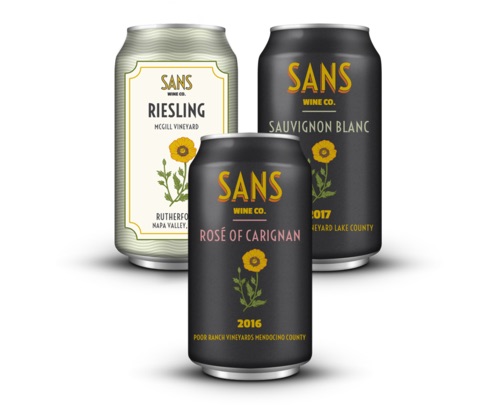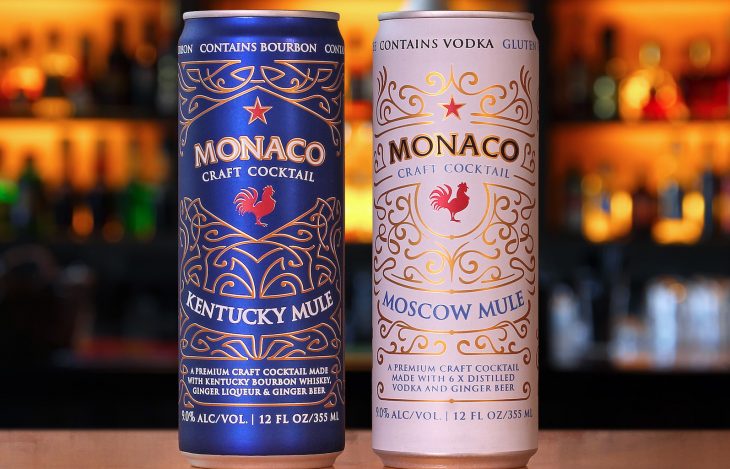For decades beer drinkers have enjoyed cold brews out of aluminum cans. Cans are inexpensive, lightweight, recyclable, and easy to fit in a cooler and bring to an outdoor event. Today, beer consumption has declined among millennials, but the generation is drinking more wine and cocktails and they are more passionate about sustainability. Premixed cocktails are now the fastest growing category in the beverage alcohol business, and the wine-in-cans market has grown rapidly from less than a $10 million to a $70 million in sales this past year according to the Aluminum Association.
Creative Canned Cocktails
Atomic Brands, the company behind the Monaco premium spirit cocktails uses real distilled spirits in its canned cocktails instead of malt or flavored beer. Not for the faint of heart, Monaco’s new Moscow Mule has 6x distilled Monaco vodka and the Kentucky Mule is crafted with 100% Kentucky Bourbon whiskey. Ardagh Metals, a part of Ardagh beverage group, supplies the aluminum beverage cans for the company. The Sleek™ 12 oz cans represent just one of Ardagh’s types of can bodies. They also produce small cans (330 ml) and standard cans (568 ml), single serving wine cans, and nitro cans. Customers can choose from a range of options for the customization of their aluminum cans, from thermo labels that change color based on temperature to coded tabs, and interactive packaging with QR codes.
Cutwater, a manufacturer of premium liquor products in San Diego, CA, make cocktails in colorful aluminum cans. Their creative drinks like Three Sheets Rum and Ginger, and Bourbon Whiskey Lemon Tea can be found in grocery aisles throughout the U.S.
“Enthusiasm for craft and artisan cocktails is an exciting consumer trend,” said Don Deubler, CEO of Atomic Brands. “Aluminum cans can also provide the best in package integrity, enabling the retention of very specific and satisfying taste profiles. We remain excited about the growth potential of the craft cocktail category as brands seek to extend their market reach, supported by the filling, distribution and retail display economics provided by beverage cans.”
Wine is Classy in a Can
Public acceptance of aluminum drink packaging is growing to the point that some wine makers are beginning to invest in using aluminum bottles and cans to carry their wine. A survey by Texas Tech University suggests that cans are allowing winemakers to reach new audiences, rather than eating away at existing sales of wine by the bottle. The study compiled a database of more than 450 wine-in-a-can offerings from 130 wineries around the world. The most popular sizes are 250 ml (49%), followed by 375 ml and 187 ml. The different size cans allow for portion control, a single drinker no longer has to open an entire bottle and deal with trying to keep leftover wine fresh.
Traditional wine drinkers may be apprehensive at the thought of wine from a can, but canned wine can be classy too. Sans Wine Co. sources premium wine grapes from organically farmed vineyards and environmentally conscious growers who don’t use pesticides. All of the wine Sans sells comes packaged in 375 ml cans (one can is equal to the size of half a regular wine bottle), keeping with their sustainable mindset from growing to packaging. Sans’ aptly named ‘Soda Pop Vineyard’ Cabernet Sauvignon received 90/100 points from Wine Enthusiast magazine and costs $25.00.

Sterling Vineyards, in Calistoga, CA, began selling single serving resealable aluminum bottles in January 2019. The Chardonnay, Cabernet Sauvignon, and Rosé come in recyclable aluminum bottles featuring a brushed texture in a tall, narrow, 375-ml size accented by a color cap representing the varietal (yellow for Chardonnay, etc). The trio of wines are sold nationwide and cost $8.00 per bottle.
“We probably won’t win the hearts of the traditionalists, but there has been a noticeable increase in recognition of the benefits of wine in cans as more wineries jump in the game,” said Melanie Edwards Virreira, National Accounts & Business Development manager for Ball Corp., the largest can manufacturer in the U.S. “People in the wine industry are recognizing that there is consumer demand in the market for alternative packaging that meets the need for expanding occasions and changing demographics. As more people realize the benefits of cans for both wineries and consumers, we expect acceptance to continue to grow.”

